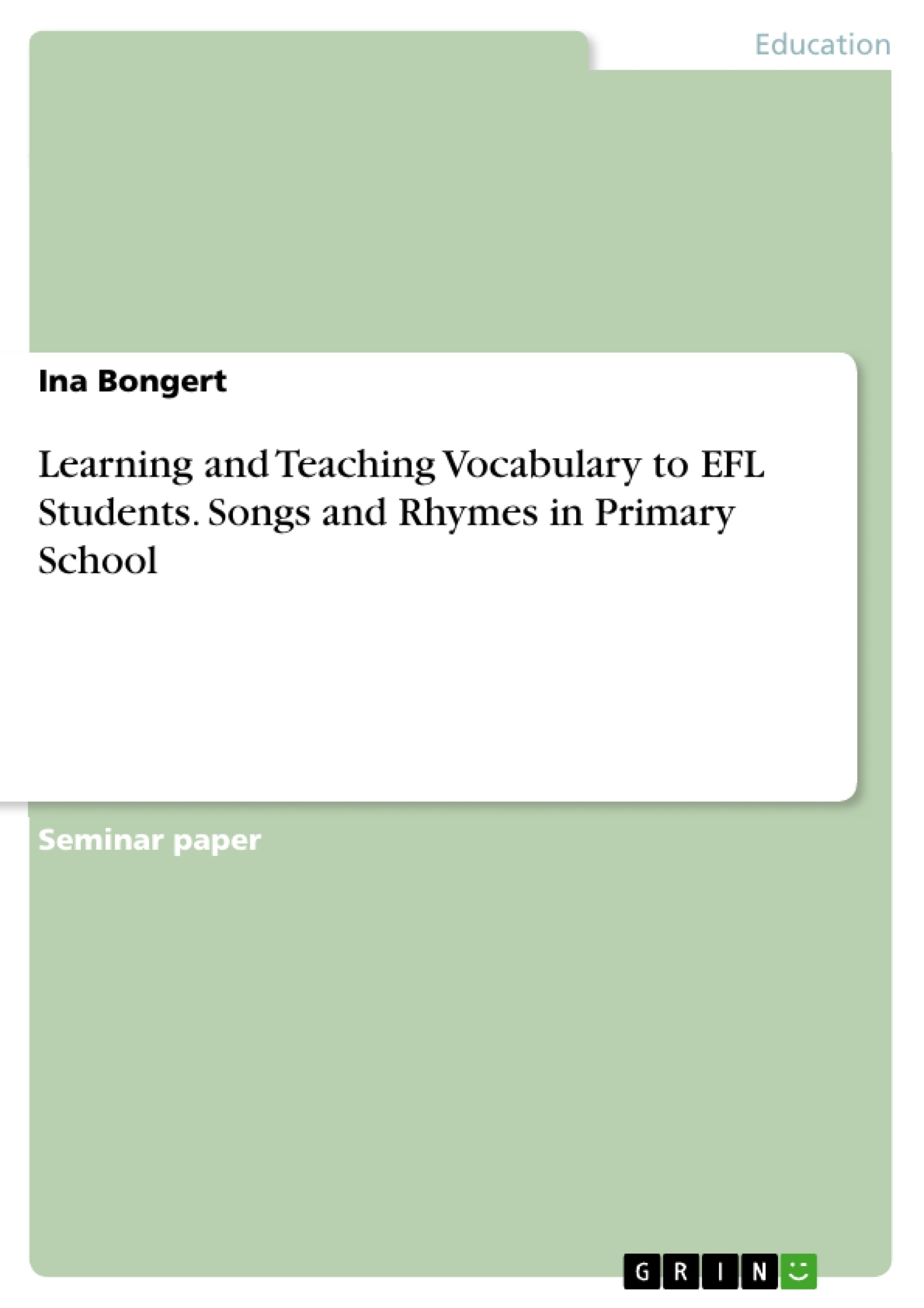This paper deals with the subject of learning and teaching vocabulary in the EFL classroom at primary school and hence provide a detailed overview of the most important aspects. Specifically, the role of songs and rhymes will be discussed, leading to the research question to what extent these are suitable to support vocabulary teaching to children.
The task of this paper is to find out to which exemplary types of materials can be used in the classroom to motivate the children and support the learning of vocabulary. Also in the curriculum songs and rhymes are mentioned several times. Thus, at the end of the school entrance phase, the children should be able to learn words in context with songs and rhymes and connect verbs with movements.
Inhaltsverzeichnis (Table of Contents)
- Introduction
- Theoretical Background
- The Importance of Vocabulary Teaching to EFL learners in Primary School
- Ways of Vocabulary Teaching and Learning
- Songs and Rhymes for Vocabulary Teaching and Learning
- Methodology
- Analysis: Evaluation of two Examples
- Discussion
- Conclusion
- References
Zielsetzung und Themenschwerpunkte (Objectives and Key Themes)
This paper aims to investigate the significance of vocabulary learning in primary school English as a Foreign Language (EFL) education, focusing specifically on the role of songs and rhymes in supporting vocabulary acquisition. The research question explores the effectiveness of these materials in motivating young EFL learners and facilitating vocabulary development.
- The Importance of Vocabulary Teaching in EFL
- Methods of Vocabulary Teaching and Learning
- The Role of Songs and Rhymes in Vocabulary Acquisition
- Motivating Young EFL Learners
- Curriculum Integration and Vocabulary Development
Zusammenfassung der Kapitel (Chapter Summaries)
The introduction establishes the crucial role of vocabulary in language acquisition and highlights the need for engaging and motivating vocabulary teaching methods in primary school EFL settings. The paper focuses on songs and rhymes as potential tools for vocabulary learning.
The theoretical background section delves into the importance of vocabulary learning for young EFL learners, emphasizing the need for building a strong vocabulary foundation. It explores various approaches to vocabulary teaching and learning, including the concept of multiword units and formulaic language.
Schlüsselwörter (Keywords)
This paper focuses on vocabulary acquisition, EFL education, primary school, songs, rhymes, motivation, multiword units, formulaic language, curriculum integration, and language learning.
Frequently Asked Questions
Why are songs and rhymes important for teaching English to primary school students?
Songs and rhymes help children learn vocabulary in context, motivate them, and allow for the connection of language with physical movements.
What is the main research question of this paper?
The paper explores to what extent songs and rhymes are suitable for supporting vocabulary teaching to young EFL (English as a Foreign Language) learners.
How do songs and rhymes fit into the primary school curriculum?
The curriculum mentions them several times as tools for the school entrance phase to help children learn words and verbs through context and movement.
What are multiword units and formulaic language in vocabulary learning?
The paper discusses these as essential approaches for building a strong vocabulary foundation by learning groups of words that often occur together.
How can teachers use these materials to motivate young learners?
By using engaging and exemplary types of musical materials, teachers can create a more interactive and enjoyable classroom environment for vocabulary acquisition.
What methodology does the paper use to evaluate these tools?
The paper includes a theoretical background followed by an analysis and evaluation of two specific examples of classroom materials.
- Citation du texte
- Ina Bongert (Auteur), 2019, Learning and Teaching Vocabulary to EFL Students. Songs and Rhymes in Primary School, Munich, GRIN Verlag, https://www.grin.com/document/1004938



